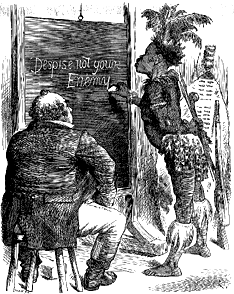

 Lesson" appeared in Punch in reaction to recent struggles with the Zulus of southern Africa, in which British forces were surprised by the difficulty they had in suppressing the native tribes. Sir John Tenniel's cartoon depicts a Zulu warrior, equipped with his weapons, writing `Despise not your enemy' on a blackboard, for the edification of the British gentlemen who watches from his stool. The image evokes combination of fear and loathing -- fear of possible defeat in the colonies and loathing of the baser races -- that characterized the English attitude towards African blacks in the later 19th century.
While the falling numbers of native and aboriginal populations during the period were taken by many to demonstrate the inevitability of the Darwinian thesis (blacks, the least of the three orders of man, were perceived as doomed to extinction), the Jamaica revolt in the mid-1860s bolstered Victorian fears of the warring ways of native savages in the colonies. Certain African tribes commanded a grudging respect from Englishmen for their military prowess, though it might be of little effect when wielded by an inferior and underdeveloped people. Tenniel's Zulu epitomizes the projection of this duality: his weapons appear `primitive' and exotic next to the English rifle, yet he stands teaching `the lesson' while the Englishman sits regarding him. The physical characterization of the African demonstrates the British perception of native blacks: the influence of contemporary craniological theories is seen in his ape-like prognathous skull shape, implying the ignorance and brutality ascribed by phrenologists and anthropologists. His sparse dress indicates the Victorian characterization of savage and uncivilized natives, which demonstrated to the English an immodesty and immorality (and tendency towards lewdness and sexual promiscuity) typical of beasts and undeveloped children. The Zulu's face is blank and empty, the "invariable and expressionless" features that indicated to Frederic William Farrar the "uniformity" of an incapable and primitive people.
That this Zulu is portrayed writing English words is significant in this context. In general, Victorian anthropologists and explorers, due to a complete unfamiliarity with native African tongues, believed their language systems to be haphazard and chaotic, inferior in every way to the defined grammatical structures of English, as well as to other `inflectional' languages of Europe. Tenniel portrays a Zulu who, despite his uncivilized nature and appearance, has mastered the subtleties of English in order to communicate his `lesson' of war to his English listener. While the image is clearly figurative, its message would be received as a threatening blow to many Victorian assumptions regarding black natives.
Lesson" appeared in Punch in reaction to recent struggles with the Zulus of southern Africa, in which British forces were surprised by the difficulty they had in suppressing the native tribes. Sir John Tenniel's cartoon depicts a Zulu warrior, equipped with his weapons, writing `Despise not your enemy' on a blackboard, for the edification of the British gentlemen who watches from his stool. The image evokes combination of fear and loathing -- fear of possible defeat in the colonies and loathing of the baser races -- that characterized the English attitude towards African blacks in the later 19th century.
While the falling numbers of native and aboriginal populations during the period were taken by many to demonstrate the inevitability of the Darwinian thesis (blacks, the least of the three orders of man, were perceived as doomed to extinction), the Jamaica revolt in the mid-1860s bolstered Victorian fears of the warring ways of native savages in the colonies. Certain African tribes commanded a grudging respect from Englishmen for their military prowess, though it might be of little effect when wielded by an inferior and underdeveloped people. Tenniel's Zulu epitomizes the projection of this duality: his weapons appear `primitive' and exotic next to the English rifle, yet he stands teaching `the lesson' while the Englishman sits regarding him. The physical characterization of the African demonstrates the British perception of native blacks: the influence of contemporary craniological theories is seen in his ape-like prognathous skull shape, implying the ignorance and brutality ascribed by phrenologists and anthropologists. His sparse dress indicates the Victorian characterization of savage and uncivilized natives, which demonstrated to the English an immodesty and immorality (and tendency towards lewdness and sexual promiscuity) typical of beasts and undeveloped children. The Zulu's face is blank and empty, the "invariable and expressionless" features that indicated to Frederic William Farrar the "uniformity" of an incapable and primitive people.
That this Zulu is portrayed writing English words is significant in this context. In general, Victorian anthropologists and explorers, due to a complete unfamiliarity with native African tongues, believed their language systems to be haphazard and chaotic, inferior in every way to the defined grammatical structures of English, as well as to other `inflectional' languages of Europe. Tenniel portrays a Zulu who, despite his uncivilized nature and appearance, has mastered the subtleties of English in order to communicate his `lesson' of war to his English listener. While the image is clearly figurative, its message would be received as a threatening blow to many Victorian assumptions regarding black natives.
[Victorian initial "A" by Harlan Wallach ©copyright 1994.]